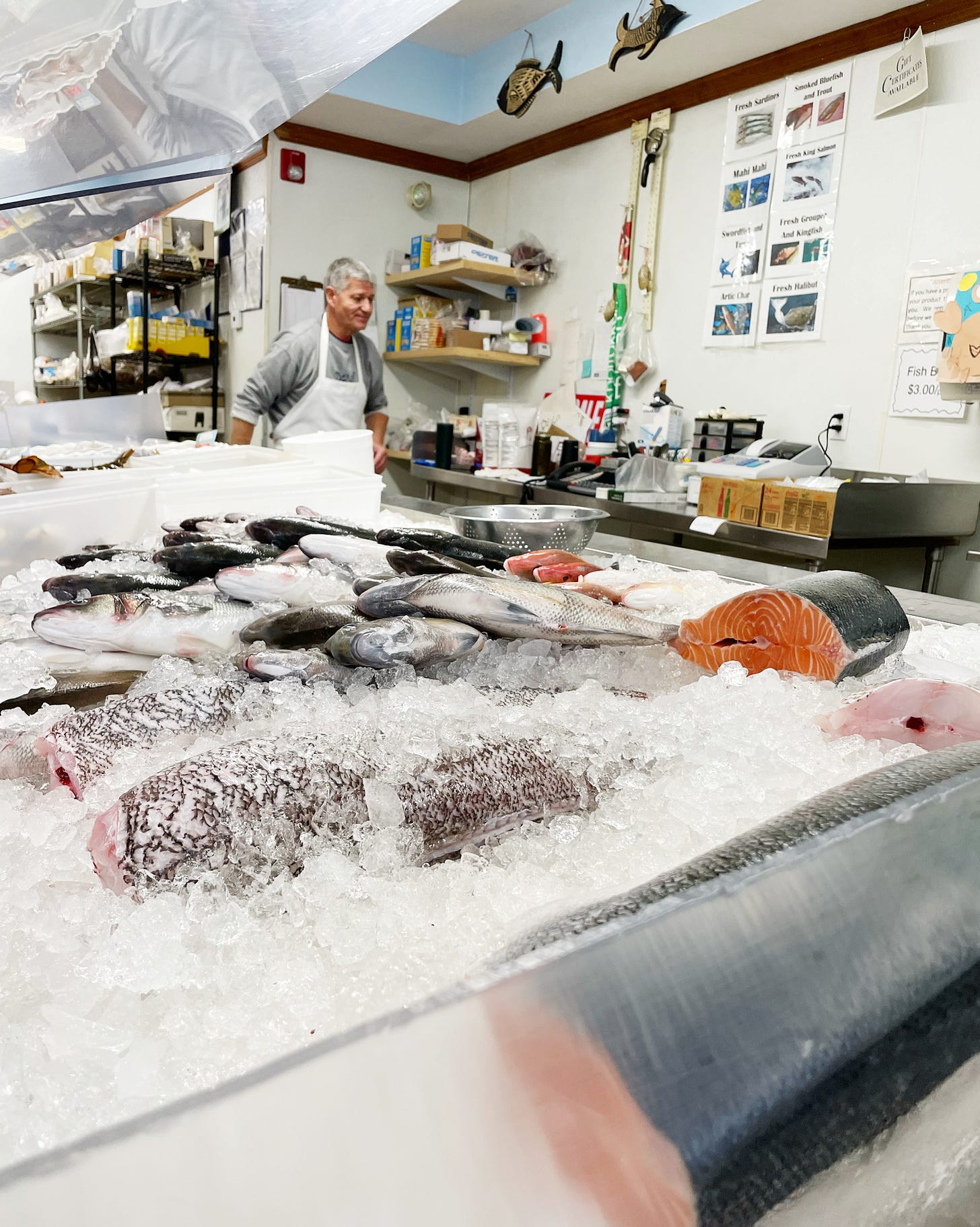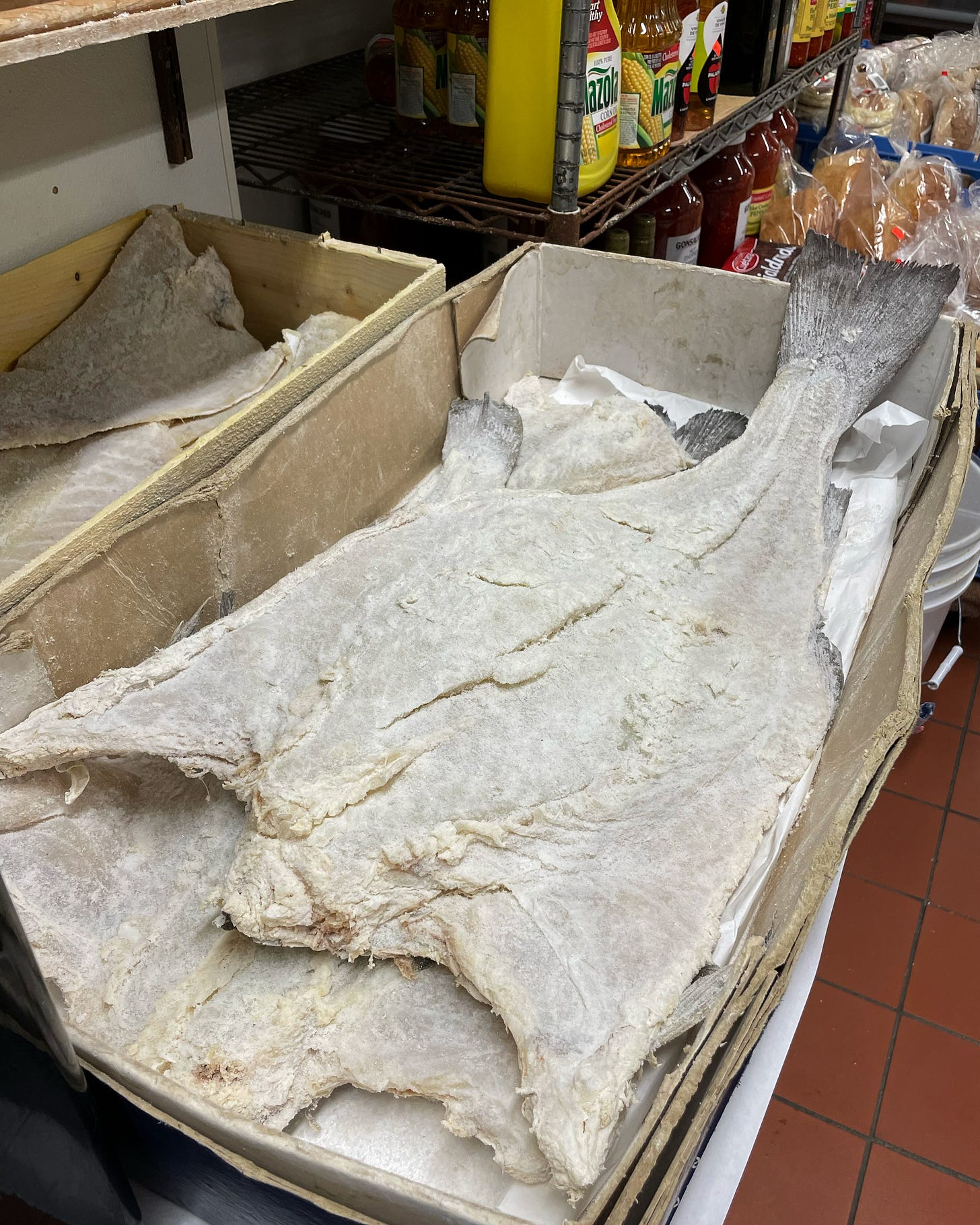Self-Checkout
My favorite fishmonger, Courthouse Fish Market in East Cambridge – one of Cambridge’s longest operating businesses, since 1912 - closed this month. It is a family business and everyone in the family who worked there is approaching retirement age; they put it up for sale over a year ago, and there were no takers. I asked the two brothers I’ve been buying from most every week for decades who else they recommended in the business. There’s no one left doing what we do, said Joe. No one wants to do this work any more, said Eddy - possibly including himself in the statement. They weren’t maudlin; they were smiling, if a bit ruefully. They’ve earned their retirement.
“Are we really going to have to buy our fish from Amazon,” Naomi sighed, when I told her the news. The Amazon-owned chainstore Whole Foods is where most of our immediate neighbors pick up fish, even though we live by the ocean in a region famous for the quality of its seafood. The nearest fishmonger to our home closed a couple years ago. The next nearest closed a decade ago. But I never went to either anyway, cause I always preferred going across town to Courthouse Fish.
At Courthouse, I learned a lot about fish from Eddy and Joe (and Al, the eldest brother who retired some years ago) but I also learned a lot about my larger community. Regular patrons included the older Portuguese residents of East Cambridge, whom Eddy and Joe spoke to in the language they’d learned from their parents. More recent Brazilian immigrants came, also speaking Portuguese of course; and so did the wider Caribbean community, with its mix of Creole, Spanish and English. On Saturdays there were groups of young men from Gulf states like Qatar and Emirates, temporary residents studying or working here and rooming together while they did. I met Moroccans, Indians, Japanese, pretty much everyone from anywhere near the sea who had come to Boston and was now looking to buy ingredients needed for their home cooking. I watched what they all bought, and I asked them all for recipes.
Eddy and Joe knew their customers; they gently warned people if they seemed to be wandering away from their usual budget, and might point out what was good that day which wouldn’t be too expensive. There was a handwritten sign that EBT cards were welcome. They rolled their eyes when certain difficult characters walked in the door, or after they left. They gossiped about the town, griped about the government, avoided explicit politics but dropped hints that they weren’t too thrilled with everything liberal Cambridge generally takes for granted. Older ladies were teasingly flirted with, guys dissed now and then, and the parade of Harvard and MIT-connected professionals seemed to be judged largely on their knowledge of fish. They remembered names; jobs; asked after spouses and children. And this was just the retail part of the business – they were down at the pier buying fish in the morning, and their network of suppliers had to be equally if not even more extensive.
They taught me which fish to buy in which season – what was local, what was brought in from where, what was especially good right now and what was unfortunately overpriced due to supply and demand. Whenever tuna hit prices they judged outrageous (the best tuna on the docks in Boston is auctioned to Japan and to New York restaurants), they didn’t stock it at all, even though some customers would have bought it regardless. And when a quality fish fell to them at an especially good price (passed over by the high-flying buyers for whatever reason), they put it out for less than you’d see anywhere else. They saved all the useful trimmings from large fish, selling heads and frames cheap for soup, and collars and bellies and roe to those of us who relish such things. (Their father ate roe for breakfast and consequently neither had developed a taste for it, they told me once as I gratefully took yet another pair off their hands.)
In time, I heard about their health, kids, holidays, family weddings, vacations (Eddy likes cruises)… and eventually, although they didn’t give much advance warning, plans for retirement. Their younger sister Diane runs the family fish restaurant next door which will stay open, so I could go in there and buy some things while they still supply and cut for her, they assured me and all the other regulars. I don’t know yet if that’s strictly true, but I’ll certainly put it to the test. Damned if I’ll buy fish at Whole Foods if I can avoid it.
Regardless of the seafood I will or won’t find for sale elsewhere, there’s nothing to replace the role of Courthouse Fish in the community. The same happened when our local grocer shut, shortly before the pandemic. I used to see the kids from the neighborhood there after school, buying candy at the register. And nannies from the big houses, charging lamb chops to the family account. And older doctors and lawyers, sent for milk or eggs and picking up a box of cookies. And Peter Wolf (yes, that Peter Wolf), dressed in black from head to toe, putting his groceries in a paper bag. Where can I see them all now?
As our neighborhood shops close, our neighborhood becomes less visible to itself. I will no longer meet as many in my community as I did at Courthouse Fish. Like everyone else I’ll go to one of several nearby Whole Foods, owned by Amazon, use self-checkout to avoid the big lines at registers, and talk to no one while there.
A few days after Courthouse Fish closed, Condé Nast fired most of the staff at Pitchfork, including all features editors, to fold what will be left of it into men’s magazine GQ. If you haven’t already gathered, this is my essay about that. Many of Pitchfork’s writers memorialized the site in recent days, and I’ve been enjoying all their insights and reminiscences. But each makes me feel even more keenly the loss of a community forum - a place for talk. We can’t replace these spaces, at least it doesn’t seem like we can at present. A neighborhood fish store – even one that’s been in place for over a hundred years, with a dedicated clientele – is not of this era, it’s a throwback. As is, it seems, a dedicated music journal.
Because if not Pitchfork, who. Pitchfork had developed the strongest music journalism brand of its time, employed a series of superb editors and writers, and had a global readership so large that according to one Condé Nast employee it was the most visited site in that media empire’s entire portfolio.
By volume, Pitchfork has the highest daily site visitors of any of our titles; their higher consuming segments generate more unique page views by volume than any title. This despite scant resourcing, esp from corporate. Well-placed in a post-scale era (or was)
— Claire Willett (@clairedwillett) on Twitter, January 17, 2024 [the account has since been deleted]
If not Pitchfork, with more daily visitors than Vogue or Vanity Fair or the New Yorker - or GQ – then who in music journalism can possibly thrive in this economic environment. And if no one can… then all we’ll have left are streaming platforms, their algorithms, and the atomized consumer behavior they push on us. A self-checkout counter for music, with a scanner going beep – beep – beep –
Listening to: Nehan, An Evening with…
Cooking: Bugeoguk, from dried pollack purchased at H-Mart



Thanks for writing this article. It struck me when you mentioned ‘visibility!
How will we know our community and pass on knowledge and learn from each other if there is nowhere we can meet or share common space with?
Simon and I have met so many people at Joe Martini’s - our local bar in Portugal. Through Joe we have found out local contacts for buying wood, steel work, musicians, language courses and even moustache grooming experts et al.
On our recent tour in the UK we played a concert in my home town of Ross-on-Wye. The Saturday and weekday markets have gone, the bakers where I worked as a child plus two others have now closed, so has the wool shop, the children’s toy shop, the garden and pet shop, two butchers, Hunky Dory deli, the local paper HQ, two greengrocers, a home style shop, three shoe shops, two florists, four clothes shops, two antique shops and Ross Records!
There are plenty of charity shops and cafés, take aways, estate agents and pharmacies. Two supermarkets and fortunately no McDonalds yet!!
Many pubs are also closing plus a third of grassroots music venues have now closed in the UK.
Where can we meet our community on a weekly basis to learn from each other and share in the joys of our humanity if the shops disappear and people are replaced by self-checkouts?
Perhaps our community lives will move to the parks, like teenagers, where everyone with a dog has a reason to say hello...
Love how you tied Court House and Pitchfork together. I'm at a loss as to where I will buy live soft shells this spring. There is a small, boutique fish monger in Bow Market – and have you tried New Deal? They're oriented more toward a Japanese clientele, but the few times I[ve been there, I've been impressed. Otherwise, yes, there are a few counter folk at Amazon/WF who I know and trust but it is a very different experience.